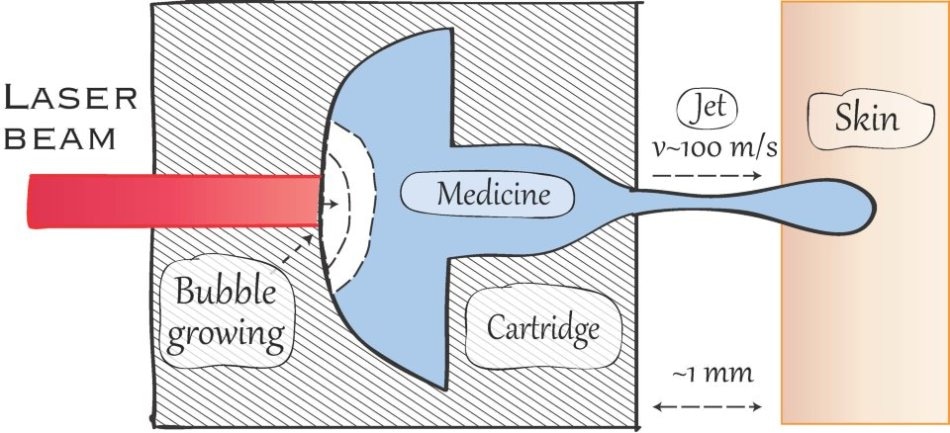Apr 17 2019
A tattoo designed to warn a person about too many hours in the sun, or to alert a person to take his/her medication? Next to their cosmetic purpose, tattoos could acquire novel functionality using intelligent ink. That would necessitate a more precise and less invasive injection method.
 Working principle of needle-free injection: laser heating the fluid. The growing bubble pushes out the fluid (medicine or ink) at very high speed. (Image credit: University of Twente)
Working principle of needle-free injection: laser heating the fluid. The growing bubble pushes out the fluid (medicine or ink) at very high speed. (Image credit: University of Twente)
Scientists of the University of Twente currently have designed a micro-jet injection technology that does not use needles at all. Instead, an ultrafast liquid jet having the thickness of a human hair pierces the skin. It is not painful and wastage is limited. In their latest publication in the Journal of Applied Physics, the researchers compare both the needle and the fluid jet methods.
Ötzi the Iceman already had, more than 5000 years ago, several simple tattoos on his body, seemingly for relief from pain. From the time when the classic “anchor” tattoo that sailors had on their arms, tattoos have become increasingly common. Approximately 44 million Europeans wear one or more of them. Regardless of its wider reception in society, the underlying method did not change and still has health hazards. One or more moving needles put ink beneath the skin surface. This is painful and can harm the skin. Besides that, needles have to be disposed of in a proper manner, and a lot of ink is wasted. The alternative that David Fernández Rivas and his colleagues are creating does not use any needles.
In their new paper, they compare this new method with conventional needle technology, on an artificial skin material and with high speed images. Oddly, according to Fernández Rivas, the conventional needle technology has never been studied in such a detailed way, using high speed images.
Fast Fluid Jet
The new method uses a laser for quickly heating a fluid that is within a microchannel on a glass chip. Heated beyond the boiling point, a vapor bubble develops and grows, forcing the liquid out at speeds up to 100 m/second (360 km/hour). The jet, measuring roughly the diameter of a human hair, can go through human skin. “You don’t feel much of it, no more than a mosquito bite”, says Fernandez Rivas.
The scientists carried out their experiments using several commercially available inks. Compared to a tattoo machine, the micro-jet guzzles only a small amount of energy. More importantly, it reduces skin damage and the injection efficiency is a lot higher, there is no fluid loss. Plus, there is no hazard of contaminated needles. The existing microjet is a single one, while tattooing is frequently performed using many needles with various types or colors of ink. Also, the volume that can be “delivered” by the microjet has to be expanded. These are subsequent steps in advancing the needle-free technology.
Skin Treatment
In the present-day medical world, tattoo-resembling methods are used for skin treatment, masking scars, or treating hair diseases. These are other areas in which the new method can be applied, as well as in vaccination. A challenging idea is using tattoos for cosmetic reasons and as health sensors simultaneously. What if the ink is light-sensitive or reacts to particular constituents that are present in sweat or in the skin?
On this new method, scientists, entrepreneurs, students, and tattoo artists join a special event “The future under our skin”, organized by David Fernandez Rivas.
The research has been carried out in the Mesoscale Chemical Systems group, part of UT’s MESA+ Institute.
(Credit: University of Twente)